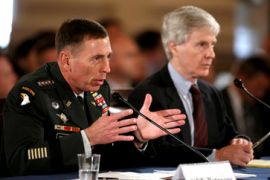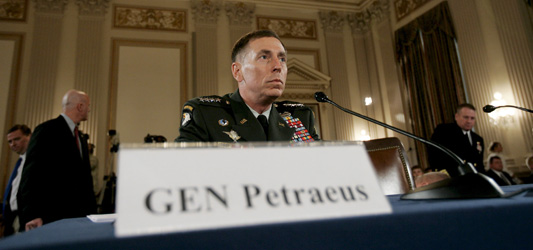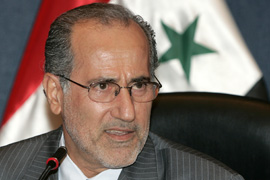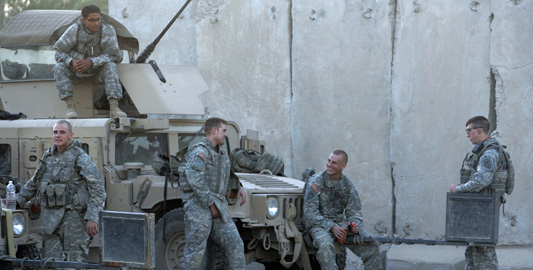Iraq welcomes Petraeus approach
Iraqi government supports US general’s testimony.

 |
| General Petraeus is due to give further testimony on Tuesday |
The government of Iraq has welcomed the latest report from the US military’s senior commander in the country and says there will be less need for foreign forces there “in the near future”.
Mowaffaq al-Rubaie, the Iraqi national security adviser, told a news conference on Tuesday the “need will be diminished for the multinational forces to conduct direct combat operations”.
|
Special report |
Speaking on Tuesday, al-Rubaie did not comment directly on Petraeus’ recommendation to cut troop numbers by about 30,000 by next summer, reducing the US presence to the levels before the so-called surge earlier this year.
In his testimony to the US congress in Washington on Monday Petraeus claimed the so-called surge was going well, and that security had been improved in some areas of Iraq, particularly in the western province of al-Anbar.
Force reductions would continue after next summer, Petraeus said, and it would be premature to make recommendations now on the pace of such cuts.
Such an assessment could be made by March 2008, he said.
The general said a “premature drawdown of our forces would likely have devastating consequences.”
Political failure
The “surge” strategy was conceived with the aim of improving security in order to push through political reforms and reconciliation in Iraq.
However the government of Nuri al-Maliki, the president, came under sharp criticism from some members of the Democrat-controlled congress which said it has failed to make any progress on the benchmarks it has been set by the US.
Al-Maliki addressed parliament on Monday in Baghdad, but made no mention of the testimony and said only that US troops were still needed as Iraqi forces were not yet ready to assume full responsibility for security.
 |
| Al-Rubaie said Iraq’s military has received the “best training” [AFP] |
Rubaie said all Iraqi army units would be trained and equipped by mid-2008. More than 80 per cent of Iraq’s army had the capability to take the lead in combat operations, he said.
“We have 500,000 soldiers and policemen, who have been given the best military training,” he said on Tuesday.
But Iraq’s parliament welcomed the report
Khalid al-Attiya, the deputy speaker, said it was “positive in general” and cognisant of the reality on the ground.
The report is aware of “the difficulties that the government faces towards fulfilling the national reconciliation process and in fixing the security in Iraq,” he said in a statement.
Scepticism
But the congressional testimony provided by Petraeus and Ryan Crocker, the US ambassador to Iraq, was met with varying degrees of scepticism in the US, Iraq and in the wider Middle East.
After several protesters were evicted from the congress chamber for heckling Tom Landos, a senior Democrat congressman described George Bush’s administration’s policy in Iraq as “myopic”.
He said “the majority of this congress and the America people want the troops out”.
Petraeus stressed his testimony was his own and had not been shown to anyone in the White House or Pentagon amid suggestions from Democrats prior to the hearing that it would be politcised.
|
“Iraq is still under foreign occupation and Iraqis continue to die in great numbers” albaghawy, Luxembourg |
But in an editorial on Tuesday The New York Times described the general’s testimony as “another of the broken promises and false claims we have heard from Mr Bush”.
“The American people deserve more than what the general and the diplomat offered them yesterday,” the paper said.
There was also strong reaction to the hearing in Iran after the Islamic Republic was singled out for criticism by both men.
Petraeus accused Tehran of fighting a “proxy war” in Baghdad, while Crocker said that only Iran would benefit from continuing instability in the country.
“Whatever has gone wrong and whenever there are security failures they keep blaming Iran for that,” Zibakalam Sadegh, a professor of political science at Tehran University, told Al Jazeera.
“None of the American leaders have ever been able to answer the simple question of ‘what has Iran to gain from insecurity in Iraq?'”
Meanwhile, the new head of Iran’s Revolutionary Guards warned Washington on Tuesday that Tehran has identified “US weak points” in Iraq and Afghanistan and would give a decisive response to any attack.
“The Revolutionary Guards have identified all the weak points of the enemy in Iraq and Afghanistan and based on this have consolidated the defensive capabilities of the country,” General Mohammad Ali Jaafari was reported as saying by state broadcasting.
 |
| The Iraqi government says US troops are needed in Iraq – for now [AFP] |
